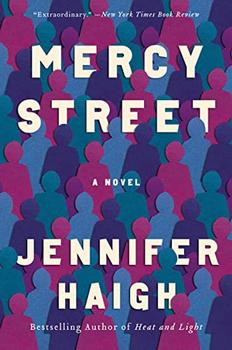Summary | Excerpt | Reviews | Beyond the Book | Readalikes | Genres & Themes | Author Bio

A Novel
by Jennifer Haigh
Naomi looked dumbfounded. "You're driving?"
If there was another way to get to Clayburn, Claudia didn't know about it. "I want to make sure the place is still standing. That last storm packed a wallop."
"That's crazy," said Naomi. "Can't you just call your tenant?"
"The tenant isn't reliable." Tenant was another approximation. Here, again, there was no right word. Nicolette had been the final foster, a sulky, unappealing girl who'd taken advantage of Claudia's mother and was now taking advantage of her. Nicolette had cornered her at Deb's funeral, asking if she could stay on in the trailer—rent-free—with her young daughter. A temporary arrangement, or so it had seemed at the time.
"The tenant is unreachable," Claudia said. "Her number isn't receiving calls."
Naomi said, "That doesn't sound good."
It didn't sound bad. To Claudia, it sounded normal: to the Birches of Clayburn, Maine, this sort of thing happened all the time. No one had a landline, or regular cell phone service; they relied on cheap, disposable Tracfones. When you made or received a call, you were charged by the minute. When your minutes ran out, the phone was unusable until you bought more of them at Walmart. Claudia didn't explain this to Naomi. To a Harvard anthropologist, aboriginal fertility rites would be less exotic.
The hotline rang again. As Claudia was reaching for her headset, Mary Fahey stuck her head in the doorway.
"Claudia, I need you. We've got an Access patient out front."
THE PATIENT WAS WAITING IN THE COUNSELING OFFICE—A cramped closet next to the waiting room, just big enough to hold a desk and three chairs. Vanessa M. was a cute round-faced girl with box braids and a wispy, timorous voice. According to her file she was seventeen years old, and ten weeks pregnant.
"Everything you tell me today will be kept confidential here at the clinic," Claudia began, "unless you tell me someone is hurting you or not taking care of you, or if you are going to hurt yourself or someone else. If you tell me any of those things, I have to tell someone outside the clinic so we can make sure you're safe." With minors, this was standard protocol. Every staffer at the clinic was a mandated reporter. Once or twice a year, sometimes more, Claudia placed a call to DCF to initiate a 51A report.
Vanessa answered her questions in monosyllables. Yes, she was aware of all her options. No, no one had pressured her to have an abortion. When asked about her plans for the future, she was more expansive. In September she would begin classes at UMass Boston, to study communications and later, speech pathology. Her sister was raising a deaf son. Someday, Vanessa would teach the boy to talk.
Vanessa M. The name abbreviated, AA-style, to protect the patient's privacy. This too was standard protocol.
"I definitely want kids someday," she said softly. "Most definitely. Just—you know—not now."
Claudia explained that with a medication AB, she could expect six to eight hours of heavy bleeding and strong cramping. "Like a bad period," she added. "Ibuprofen will help with the cramps."
Mary returned with Vanessa's legal guardian—a stout, pugnacious aunt who reminded Claudia of her own mother. The aunt had agreed to sign the consent form, but was palpably displeased.
She signed the form without speaking. Before leaving, she paused at the door. "It's Vanessa's decision, but I don't mind telling you, I'm not comfortable with this." She looked Claudia up and down. "You have kids?"
Of course, she'd been asked this before. The askers—often Black or Latina, and mothers themselves—were unsurprised by her answer. They eyed her with suspicion, a White woman who didn't love children.
Claudia felt the sting of their judgment, but she couldn't argue with the verdict. She was White and she didn't love children—at least, not in the global, unconditional way women were supposed to. She loved them strictly on a case-by-case basis, having learned early on that some were intolerable. In the Maine foster care system, many were: unruly, needy, hemorrhaging rage and fear. That they had good reasons for being so didn't make them any easier to deal with.
Excerpted from Mercy Street by Jennifer Haigh. Copyright © 2022 by Jennifer Haigh. Excerpted by permission of Ecco. All rights reserved. No part of this excerpt may be reproduced or reprinted without permission in writing from the publisher.
Your guide toexceptional books
BookBrowse seeks out and recommends the best in contemporary fiction and nonfiction—books that not only engage and entertain but also deepen our understanding of ourselves and the world around us.